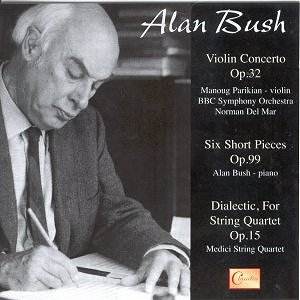A welcome reissue of Hyperion’s 1985 LP of works representing
Alan Bush at his best has been achieved by the Alan Bush Music Trust,
with assistance from the RVW Trust and donations from numerous named
individuals. Bush had a long and chequered career (banned by the BBC
for his political views briefly, until Hitler invaded the Soviet Union).
His operas enjoyed many successful professional productions in the G.D.R.
and the U.S.S.R. but have been little seen in UK. Although his music
is uneven, Bush’s continued neglect is undeserved; this is strong music,
even though it eschews the latest fashions.
The invigorating Dialectic (1929) was included
in a centenary
concert reviewed in S&H. It treats five main themes,
developed and recapitulated in combination with one another, and is
intellectually satisfying (there is a more recent recording of it by
the Bochmann Quartet Redcliffe
RR013 (1997). The late piano pieces are modest in pianistic demands
and interesting – I look forward to playing them. The Violin Concerto
(1948) is as good as any of the period. It is a major work playing continuously
for nearly half an hour and should be a contender for revival by younger
violinists wanting something different for their repertoires.
All the performances are entirely satisfactory and
the transfer is excellent. There is a biographical note by his daughter
which begins, rather improbably – ‘Dr Alan Bush was born in London on
22 December 1900’ and it is a pity that Peter Lamb’s rather defensive
and old-fashioned 1985 note for Hyperion, with its ‘the afore-mentioned
stylistic change - - ‘, ‘there can be no doubt - -’, ‘an undoubted masterpiece
- -’ etc, redolent of special pleading, was reprinted, as it could be
off-putting for younger listeners and raise reviewers’ hackles!
Everything you could possibly wish to know about Alan
Bush, including the dates and venues of recording (and too the provenance
of this re-release, which is not acknowledged by Claudio) is to be found
on the comprehensive and elegant Alan
Bush Music Trust website, a model of its kind.
Peter Grahame Woolf
See also review
by Rob Barnett


